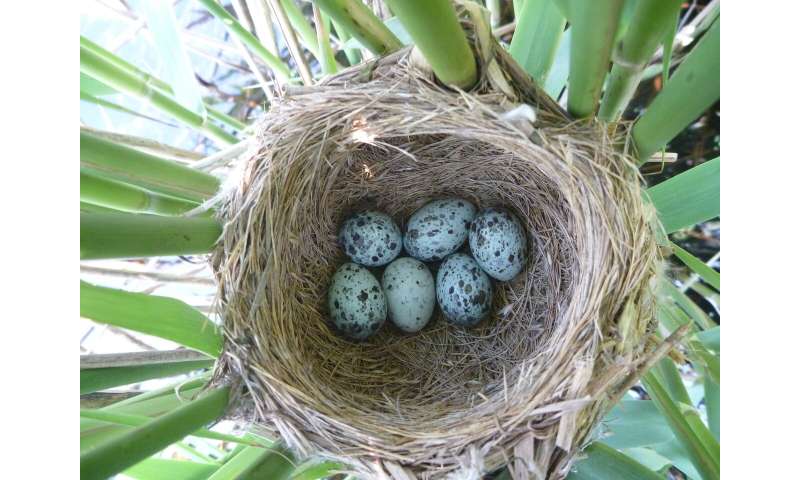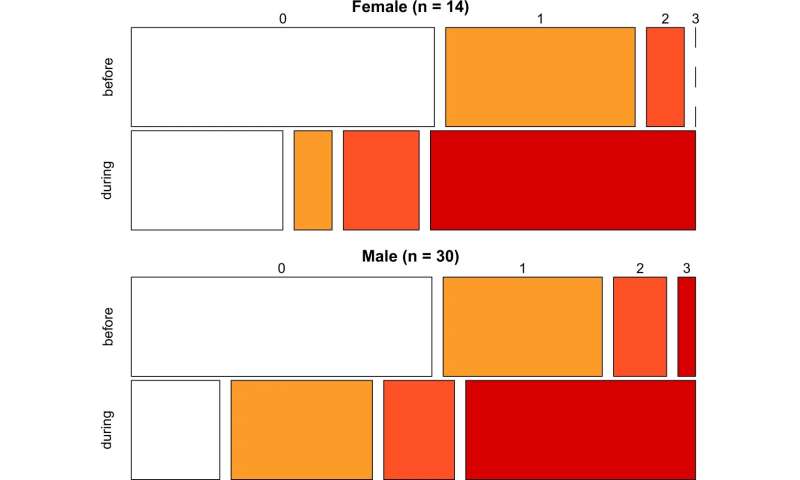Avian Catch 22: The more hosts defend their nests, the higher the chance of it being parasitized by cuckoos

The common cuckoo deploys a wide range of tricks to deceive smaller birds into raising cuckoo chicks instead of their own progeny. This is a form of parasitism: The brood parasite hijacks the parental care of the host species to maximize the number of its own offspring on the cost of the host's own brood. Female cuckoo form different maternal linages, each of which mimics the egg of only one or a few host species. Once hatched from the egg, the cuckoo fledgling ejects the foster parents' eggs from the nest, ensuring itself the whole attention of its foster parents.
The hosts that fail to protect their nests from the cuckoo will lose the chance to have their own brood—in the case of smaller hosts, this can mean missing out on their only chance to reproduce in their short lifespan. Thus, host species invest in various defenses to keep brood parasites at bay, such as mobbing adult cuckoos, breeding in well-hidden nests or recognizing the cuckoos' highly mimetic eggs (Figure 1).
Inevitably, this relationship between brood parasites and their hosts escalates in a co-evolutionary arms race, where each side evolves adaptations and counter-adaptations to ensure its own survival. A new study by Marton et al. from the University of Debrecen and the Hungarian Natural History Museum, published recently in Scientific Reports, highlights yet another piece of this evolutionary puzzle: It seems that cuckoos turn host defenses against the defenders by relying on host alarm calls to locate the nests of their hosts.
"Some host species, such as reed warblers and pipits, are remarkably similar to each other. How does the cuckoo tell the difference between the great reed warbler and the slightly smaller Eurasian reed warbler? Moreover, how does the cuckoo find the well-hidden nests of the hosts within the dense, homogenous reed beds? It surely has to rely on some cues from the hosts," said Marton.

Since it is known that cuckoos use perching sites when locating host nests, previous studies focused on such visual signals as nest visibility, nest size and reed density. However, the researchers of the current study reasoned that if the perching cuckoo is close enough to see the hosts from nearby branches, it is surely close enough to hear them, as well. If so, the alarm calls sounded by the host while defending the nest might confer valuable information for the cuckoo searching for a nest.
To test this hypothesis, the researchers placed a 3-D cuckoo dummy near the nests of great reed warbler pairs, a host commonly exploited by the cuckoo. The dummy was perceived by the hosts as a threat and was aggressively mobbed (Video 1), providing real cuckoos in the near vicinity with both visual (i.e., display movements) and auditory cues (i.e., alarm calls).
Both female and male cuckoos exhibited strong interest toward the hosts in the two-minute period when they were mobbing the 3-D cuckoo, compared with the two minutes prior to the experimental trials (Figure 2). Similar results were observed when there were no visual signals during the playback of alarmed host vocalizations and the song of the collared dove, which was used as a control. Compared to their reaction to the sound of the dove, brood parasites approached the experimental setup more often during the alarm call playbacks of their hosts. Moreover, the researchers found that great reed warblers paid the price of their nest defense: Pairs that were more prone to alarm during the researcher's regular nest visits were more often parasitized than the pairs less prone to alarm (Figure 3).

"It is probably like in the popular children's game in which the closer you get to the target, the 'hotter' it gets, while it's 'colder' if you are not looking in the right place. The more alarmed the hosts, the closer the cuckoo is to the nest," said Marton.
As a behavior trait, nest defense is likely to survive in nature only if its benefits are higher than its costs on a populational level. The risk of being parasitized by a brood parasite is worth taking if more great reed warbler nestlings fledge successfully when their parents defend their nests against predators (e.g. snakes, jays, small carnivores). This is not the case when the density of the brood parasite is high—then nest defense can become altogether maladaptive for the host.
The authors conclude that alarm calls might play an important role in the recognition of the host species by the brood parasites: "Passerine nestlings recognize the species-specific alarm calls of their parents, but for brood parasitic nestlings, the imprinting on the alarm calls of their foster parents might be important later in life when they return to the breeding area as adults."
This story is part of Science X Dialog, where researchers can report findings from their published research articles. Visit this page for information about ScienceX Dialog and how to participate.
More information:
Attila Marton et al. Host alarm calls attract the unwanted attention of the brood parasitic common cuckoo, Scientific Reports (2019). DOI: 10.1038/s41598-019-54909-1